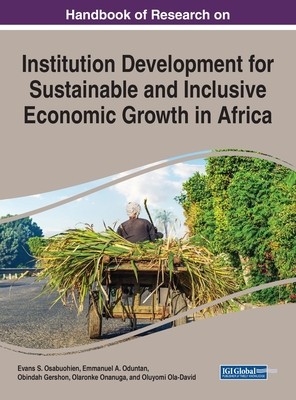
- We will send in 10–14 business days.
- Publisher: Business Science Reference
- ISBN-10: 1799848175
- ISBN-13: 9781799848172
- Format: 21.6 x 27.9 x 3 cm, hardcover
- Language: English
- SAVE -10% with code: EXTRA
Handbook of Research on Institution Development for Sustainable and Inclusive Economic Growth in Africa (e-book) (used book) | bookbook.eu
Reviews
Description
African countries are pursuing a number of development agendas toward achieving economic growth that is inclusive, pro-poor, and sustainable, particularly the type that can unleash the potential of women and booming youthful populations. However, available evidence shows that many African countries have experienced economic hardships and have performed more poorly than other developing and emerging countries in the global south. The Handbook of Research on Institution Development for Sustainable and Inclusive Economic Growth in Africa is an essential research publication that provides comprehensive research on the processes of building viable institutions in Africa that will serve as the fulcrum for utilizing and managing resources as well as promoting economic growth that is inclusive and sustainable. Featuring topics such as climate change, financial development, and poverty, this book is ideal for researchers, policymakers, developers, economic professionals, academicians, government officials, business professionals, and students.
EXTRA 10 % discount with code: EXTRA
The promotion ends in 20d.02:50:54
The discount code is valid when purchasing from 10 €. Discounts do not stack.
- Publisher: Business Science Reference
- ISBN-10: 1799848175
- ISBN-13: 9781799848172
- Format: 21.6 x 27.9 x 3 cm, hardcover
- Language: English English
African countries are pursuing a number of development agendas toward achieving economic growth that is inclusive, pro-poor, and sustainable, particularly the type that can unleash the potential of women and booming youthful populations. However, available evidence shows that many African countries have experienced economic hardships and have performed more poorly than other developing and emerging countries in the global south. The Handbook of Research on Institution Development for Sustainable and Inclusive Economic Growth in Africa is an essential research publication that provides comprehensive research on the processes of building viable institutions in Africa that will serve as the fulcrum for utilizing and managing resources as well as promoting economic growth that is inclusive and sustainable. Featuring topics such as climate change, financial development, and poverty, this book is ideal for researchers, policymakers, developers, economic professionals, academicians, government officials, business professionals, and students.


Reviews